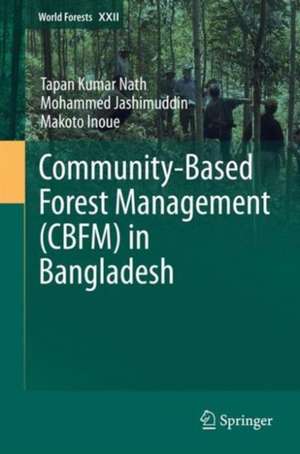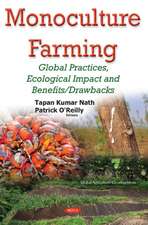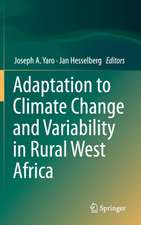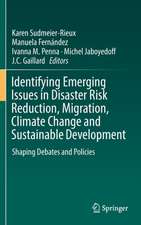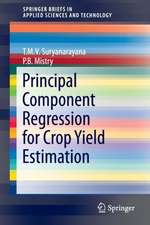Community-Based Forest Management (CBFM) in Bangladesh: World Forests, cartea 22
Autor Tapan Kumar Nath, Mohammed Jashimuddin, Makoto Inoueen Limba Engleză Hardback – 9 aug 2016
The book is immensely beneficial to the readers to have a clear understanding of various CBFM practices prevailing in Bangladesh.
Providing a comprehensive and critical analysis of success stories concerning several CBFM practices in different forest areas of Bangladesh, together with their respective strengths and weaknesses, it identifies sharing authority to take decision by the community as one of the main weaknesses. The other main weakness is the lack of beat level authority to coordinate with community for making the process vibrant. The book determines that it is the community patrol group which is most effective under the co-management system, yet the general body and executive committee of the co-management system are composed of different stakeholders, each of which is subject to their own work pressures, and are not as effective as claimed. There is a need to empower communities living in and around forests, and to create ownership of the forests so that theycan feel that the forests around them are by the community and for the community.
| Toate formatele și edițiile | Preț | Express |
|---|---|---|
| Paperback (1) | 550.77 lei 38-44 zile | |
| Springer International Publishing – 12 iun 2018 | 550.77 lei 38-44 zile | |
| Hardback (1) | 643.48 lei 3-5 săpt. | |
| Springer International Publishing – 9 aug 2016 | 643.48 lei 3-5 săpt. |
Din seria World Forests
- 15%
 Preț: 646.43 lei
Preț: 646.43 lei - 18%
 Preț: 1235.43 lei
Preț: 1235.43 lei - 18%
 Preț: 1225.94 lei
Preț: 1225.94 lei - 15%
 Preț: 631.53 lei
Preț: 631.53 lei - 18%
 Preț: 1233.37 lei
Preț: 1233.37 lei - 18%
 Preț: 947.35 lei
Preț: 947.35 lei - 18%
 Preț: 943.57 lei
Preț: 943.57 lei - 18%
 Preț: 946.41 lei
Preț: 946.41 lei - 18%
 Preț: 953.35 lei
Preț: 953.35 lei - 18%
 Preț: 1559.80 lei
Preț: 1559.80 lei - 15%
 Preț: 644.95 lei
Preț: 644.95 lei - 15%
 Preț: 640.06 lei
Preț: 640.06 lei - 15%
 Preț: 645.60 lei
Preț: 645.60 lei - 18%
 Preț: 1223.55 lei
Preț: 1223.55 lei - 18%
 Preț: 730.35 lei
Preț: 730.35 lei - 18%
 Preț: 1107.56 lei
Preț: 1107.56 lei - 18%
 Preț: 1240.30 lei
Preț: 1240.30 lei - 18%
 Preț: 952.40 lei
Preț: 952.40 lei - 20%
 Preț: 552.13 lei
Preț: 552.13 lei - 18%
 Preț: 954.45 lei
Preț: 954.45 lei - 24%
 Preț: 779.25 lei
Preț: 779.25 lei - 24%
 Preț: 1058.46 lei
Preț: 1058.46 lei - 18%
 Preț: 943.57 lei
Preț: 943.57 lei
Preț: 643.48 lei
Preț vechi: 757.04 lei
-15% Nou
Puncte Express: 965
Preț estimativ în valută:
123.14€ • 133.72$ • 103.44£
123.14€ • 133.72$ • 103.44£
Carte disponibilă
Livrare economică 01-15 aprilie
Preluare comenzi: 021 569.72.76
Specificații
ISBN-13: 9783319423869
ISBN-10: 331942386X
Pagini: 184
Ilustrații: XV, 176 p. 22 illus., 19 illus. in color.
Dimensiuni: 155 x 235 x 16 mm
Greutate: 0.5 kg
Ediția:1st ed. 2016
Editura: Springer International Publishing
Colecția Springer
Seria World Forests
Locul publicării:Cham, Switzerland
ISBN-10: 331942386X
Pagini: 184
Ilustrații: XV, 176 p. 22 illus., 19 illus. in color.
Dimensiuni: 155 x 235 x 16 mm
Greutate: 0.5 kg
Ediția:1st ed. 2016
Editura: Springer International Publishing
Colecția Springer
Seria World Forests
Locul publicării:Cham, Switzerland
Cuprins
Introduction, Aims and Outline.- The CBFM in Bangladesh: A Historical Background.- Betagi-Pomra Community Forestry (CF): 35 Years of Pioneer CBFM in Bangladesh.- Co-management of Protected Areas (PA): A paradigm Shift in PA Management.- The Village Common Forest (VCF): Community Driven Forest Conservation in Chittagong Hill Tracts.- Community Participation in Agroforestry Development: Lessons Learned from a Collaborative Research Project.- Towards Sustainability of Community Based Forest Management.
Notă biografică
Tapan Kumar Nath is currently an Associate Professor at the School of Biosciences, University of Nottingham Malaysia Campus. His work focuses on collaborative natural resources management, livelihood analysis, project monitoring, and evaluation. His on-going research focuses on the environmental ethics of peat swamp forests, community-managed urban forests and participatory agroforestry. He has led several national and international research projects, and has authored, co-authored and edited numerous publications including “Monoculture Farming: Global Practices, Ecological Impact and Benefits/Drawbacks” (2016).
Mohammed Jashimuddin is a Professor of Forestry and Environmental Sciences at the University of Chittagong, Bangladesh. His research interests include land use and policy analysis, tropical forest management, people-oriented forestry, co-management, ecotourism, monitoring and evaluation of forestry development projects based on realities in the field, land use, and forest and environment policy science. He has led national and international research projects, and provided consultancy services for development projects. He has authored a book on “Drivers of land use change and policy Analysis in Bangladesh: Theory and Policy Recommendations” (Lambert Academic Publishing, 2011) and co-authored a book chapter on “Do the Changes of Policy Ensure Good Forest Governance? Case of Community Forestry in Bangladesh” in “Multi-level Forest Governance in Asia: Concepts, Challenges and the Way Forward” (SAGE Publications, 2015).
Makoto Inoue is Professor of Forest Environmental Studies at the University of Tokyo, Japan. His specialty is common-pool resource governance to reflect realities in the field and combining sociology, and anthropology as well as forest policy science perspectives. He has led international research projects and edited books such as “People and Forest: Policy and Local Reality in Southeast Asia, the Russian Far East, and Japan” (Kluwer Academic Publishers, 2003), “Collaborative Governance of Forests: Towards Sustainable Forest Resource Utilization” (University of Tokyo Press, 2015), and “Multi-level Forest Governance in Asia: Concepts, Challenges and the Way Forward” (SAGE Publications, 2015).
Textul de pe ultima copertă
The book is immensely beneficial to the readers to have a clear understanding of various CBFM practices prevailing in Bangladesh.
Providing a comprehensive and critical analysis of success stories concerning several CBFM practices in different forest areas of Bangladesh, together with their respective strengths and weaknesses, it identifies sharing authority to take decision by the community as one of the main weaknesses. The other main weakness is the lack of beat level authority to coordinate with community for making the process vibrant. The book determines that it is the community patrol group which is most effective under the co-management system, yet the general body and executive committee of the co-management system are composed of different stakeholders, each of which is subject to their own work pressures, and are not as effective as claimed. There is a need to empower communities living in and around forests, and to create ownership of the forests so that theycan feel that the forests around them are by the community and for the community.
Caracteristici
An evidence-based work that evaluates various CBFM practices on the basis of extensive field data sets Critically analyzes current CBFM practices and outlines important policy implications Includes detailed research methods researchers can adopt in similar studies Includes supplementary material: sn.pub/extras
